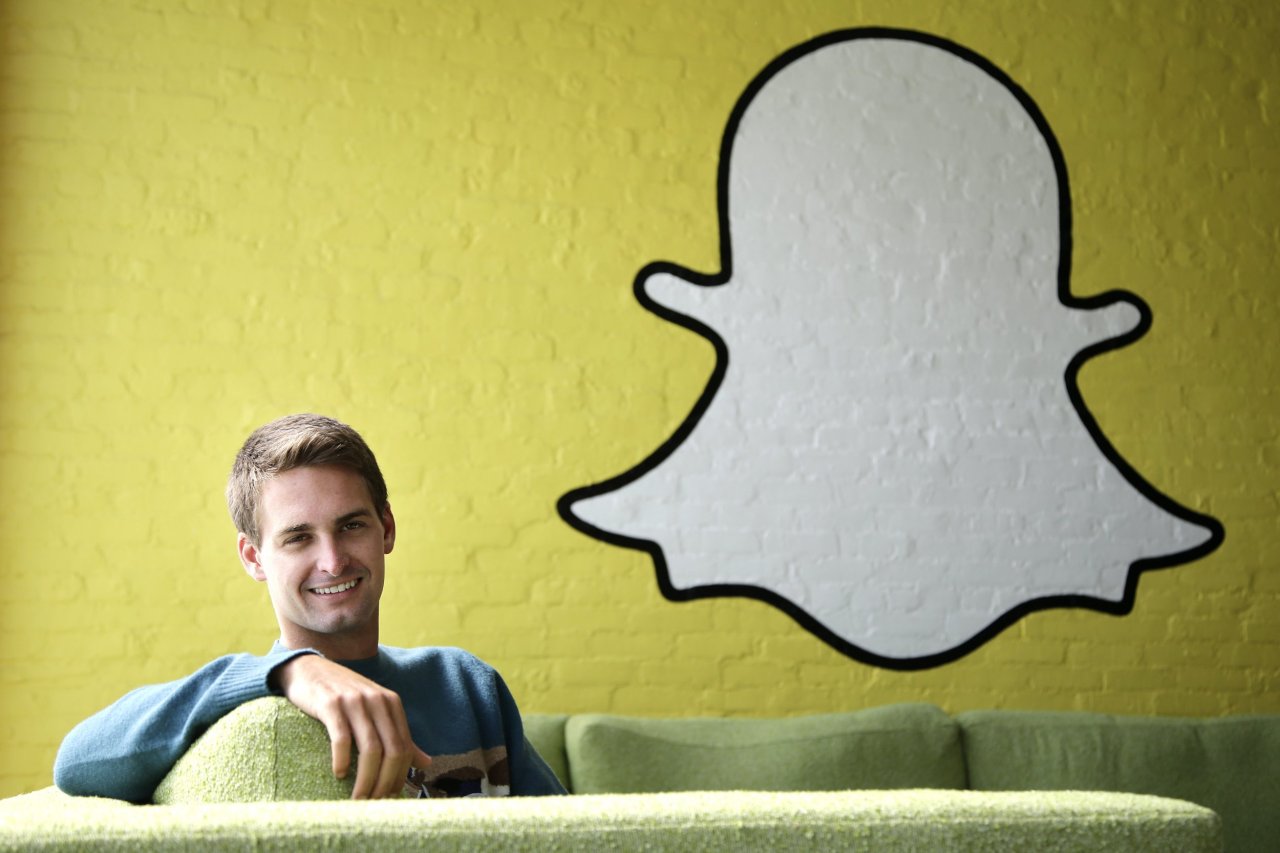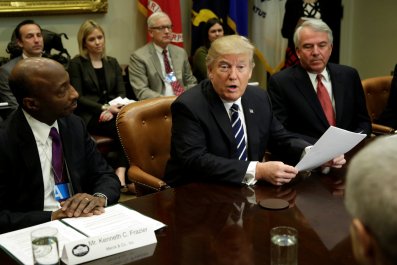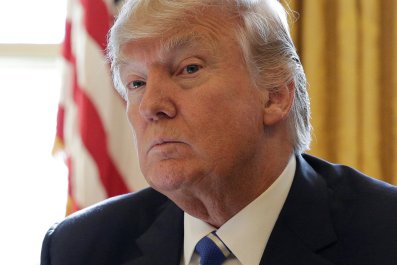Updated | Donald Trump may be the best thing that could happen to Snap's upcoming initial public offering.
It's not just that Snap's Snapchat app stands to gain millions of users as people flee the noxious political cloud that has enveloped Facebook like pollution on a red-alert day in Beijing. There's an even more significant way the new president will help the company: He is stoking fears about privacy and an Orwellian surveillance state, and Snap is one of the few social media companies that doesn't base its business model on knowing everything it can about you. So, the thinking goes, a few years down the road, maybe you'll be able to enjoy mainstream media on Snapchat absent the worry you'll get a midnight knock on the door.
This might be the year the cost of giving up our privacy gets too high. Until recently, most of us haven't been overly concerned about our digital privacy. We have pretty readily exposed ourselves in order to get cool free services from Facebook, Google and myriad other companies. But new technologies are starting to eat away at our privacy in ways we've never before experienced. And now the Trump administration wants to guard your data about the way a cat might offer to guard a bird feeder. Trump apparently plans to let security organizations such as the National Security Agency (NSA)—and even scarier ones like Comcast—grab your data and use it just about any way they want.
We're starting to recoil. A Pew Research survey in January found that half of Americans feel their personal information is less secure than it was five years ago, while nearly one-third are not confident the federal government will keep their personal information safe. Normally, people don't do much about such worries, but that seems to be changing. AnchorFree, which makes privacy-protection software for consumers, told me it got surprised by a massive spike in U.S. signups since Trump was elected. It's similar to the surge AnchorFree saw from citizens of Egypt and Tunisia during the Arab Spring revolts. "During the [attempted] coup in Turkey we saw more than 2 million downloads in the first two hours," CEO David Gorodyansky tells me. "Now it's the U.S. election" driving the surge.
Key members of the Trump security team—the CIA's Mike Pompeo, National Security Adviser Mike Flynn, Attorney General Jeff Sessions—have indicated they want to extend domestic surveillance. Trump has floated the idea of tracking Muslims with a database. The NSA in January got permission —from the outgoing Obama administration—to share intercepted emails, text messages and phone calls with other U.S. intelligence agencies, and privacy groups fear that change will be exploited by this administration. The new NSA policies "are widening the aperture for abuse to happen, just as abuses are becoming more likely," says Nate Cardozo, an attorney with the Electronic Frontier Foundation. At the same time, Trump's Federal Communications Commission wants to make it easier for internet providers—companies such as Comcast and AT&T—to track your every digital action and use it for marketing.
The government may be the least of your worries. Almost everything the tech industry is building these days promises to deliver amazing new products and services by way of machine learning—that is, machines that learn all about you. You're probably already used to Facebook targeting ads based on your likes and posts, or Google doing the same based on what you've typed in its search box or in Gmail and Google Docs. But that's starting to look like a ketchup sandwich compared with the intricate machine-learning dish the industry is cooking up.
Software has gotten as good as humans at understanding speech. We're installing all these Amazon Echo and Google Home listening devices in our homes. It's like a voluntary bugging operation. Supposedly these things only listen after we say a trigger word, like "Alexa," but they could listen and analyze everything said in their proximity. Police and lawyers are beguiled. In a now-famous case, James Andrew Bates was accused of killing his friend, who was found dead in a hot tub in Bates's home in Bentonville, Arkansas. Police noticed an Echo in Bates's house and asked Amazon for the log of everything the device picked up. Amazon refused, and insisted it would only have stored a few seconds of speech after the trigger word. But no doubt this will be the first of many similar legal requests.
TV maker Vizio just got fined for secretly tracking its customers' viewing habits. Mobile apps can track more than you might think. A study co-authored by Carnegie Mellon computer science professor Norman Sadeh found that mobile apps such as Groupon and Weather Channel logged a user's location every three minutes. Photo app Meitu was found to track a user's location, calls made, Wi-Fi connected to. "We've seen massive amounts of tracking," Sadeh says.
(Trump still uses his old Android phone to tweet from the White House. If Sadeh is right, doesn't that make Hillary Clinton's email scandal seem comparatively innocuous? Some genius hacker of a terrorist could probably figure out exactly which toilet he's sitting on while tweeting about Saturday Night Live.)
Tech companies like to point out that there are now a gazillion Internet of Things devices deployed. Many of those things—ones you might wear, like a Fitbit, or a connected car or even a Bluetooth sex toy—can relay data about you back to some database. If that's not personal enough, we're now buying cheap DNA tests from Ancestry.com to learn about our heritage or from 23andMe to see whether we carry genetic mutations associated with baldness, cancer and other conditions. Again, law enforcement is intrigued. After a murder in Idaho, police identified one suspect by matching DNA samples with Ancestry's database.
Wait till the NSA starts crossing your digital data with your genetic data. Security agencies could gather enough information to intimately know us—what we've said, where we've been, who we know, what we're made of. Same with Google, Facebook, Apple, Amazon and many other tech companies.
At some point, a vast swath of the population is going to realize we've been totally laid bare, and might decide to stop freely giving out personal data. A revolt like that would be tremendously costly to much of the tech industry. You pay for allegedly free services with your privacy, and then the details about you are sold to marketers, which can then precisely target you. If enough people no longer want to play that game, it's lights-out for that business model.
That's why Snap is the IPO of the moment. It is showing that a viable media business can be built without vacuuming up zettabytes of information about every customer. In Snap's filing for its IPO this spring, it said it had 158 million active users last quarter and brought in revenue of $405 million for the year—six times its 2015 revenue of $59 million. The company is growing like crazy. (Disclosure: I'm collaborating on a book with Hemant Taneja of venture firm General Catalyst, an early investor in Snap.)
In fact, Snap might be growing like crazy because it doesn't invade our privacy. Snapchat got its start by letting users send photos that quickly disappeared. It then built its business model on the idea that it is unnatural to generate data about everything we do. For thousands of years before the internet, a conversation disappeared the second it was over; no device logged everywhere you walked; when you finished the newspaper, the newspaper didn't know which stories you read.
Snap's proposition is that it can win your loyalty by giving you back your privacy. In that way, the past might turn out to be the future—and that future will come quickly if we find ourselves hiding from the Trumpstapo.
Correction: An earlier version of this story stated 23andMe can predict cancer and baldness. However, the test doesn't predict health conditions. It simply identifies mutations in a person's genes that are associated with genetic traits and risk for certain diseases.























